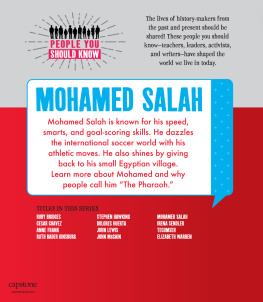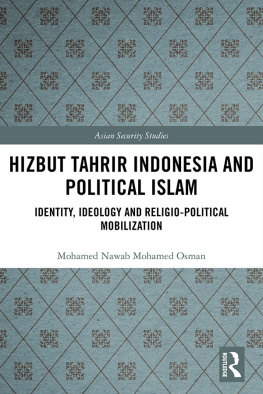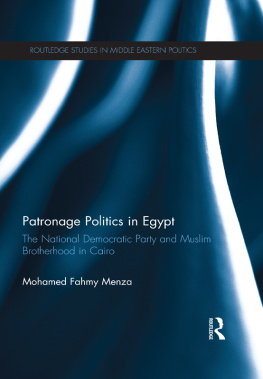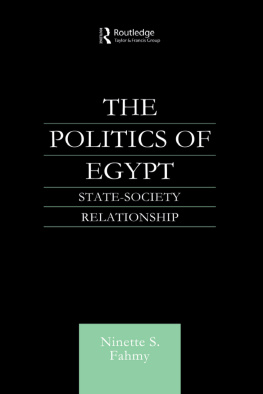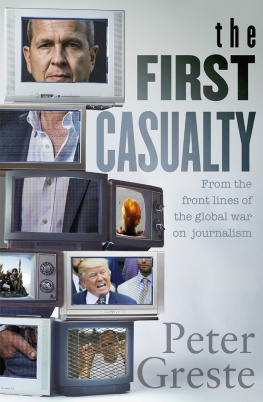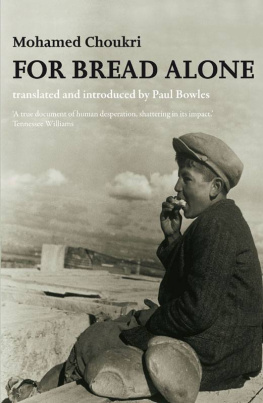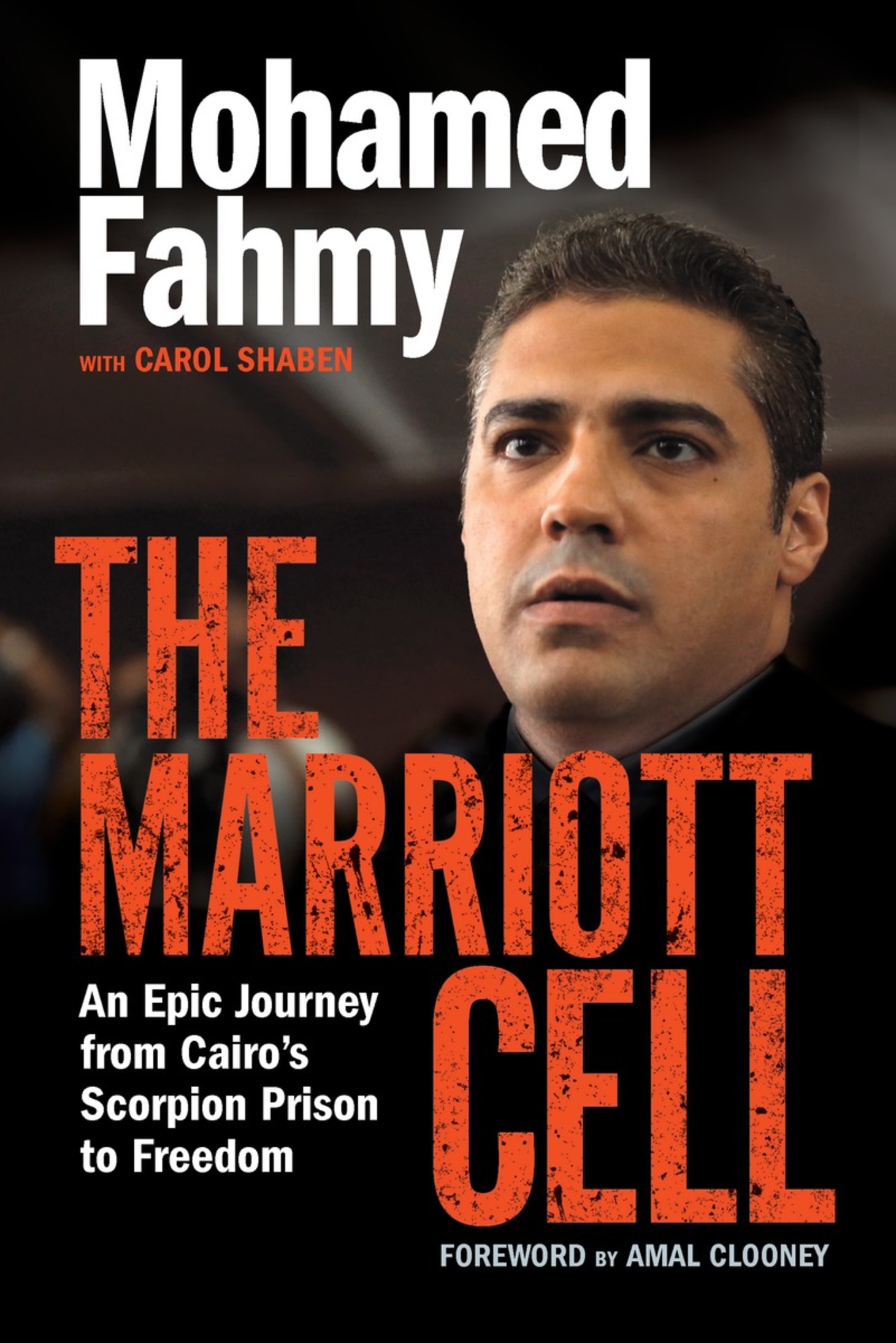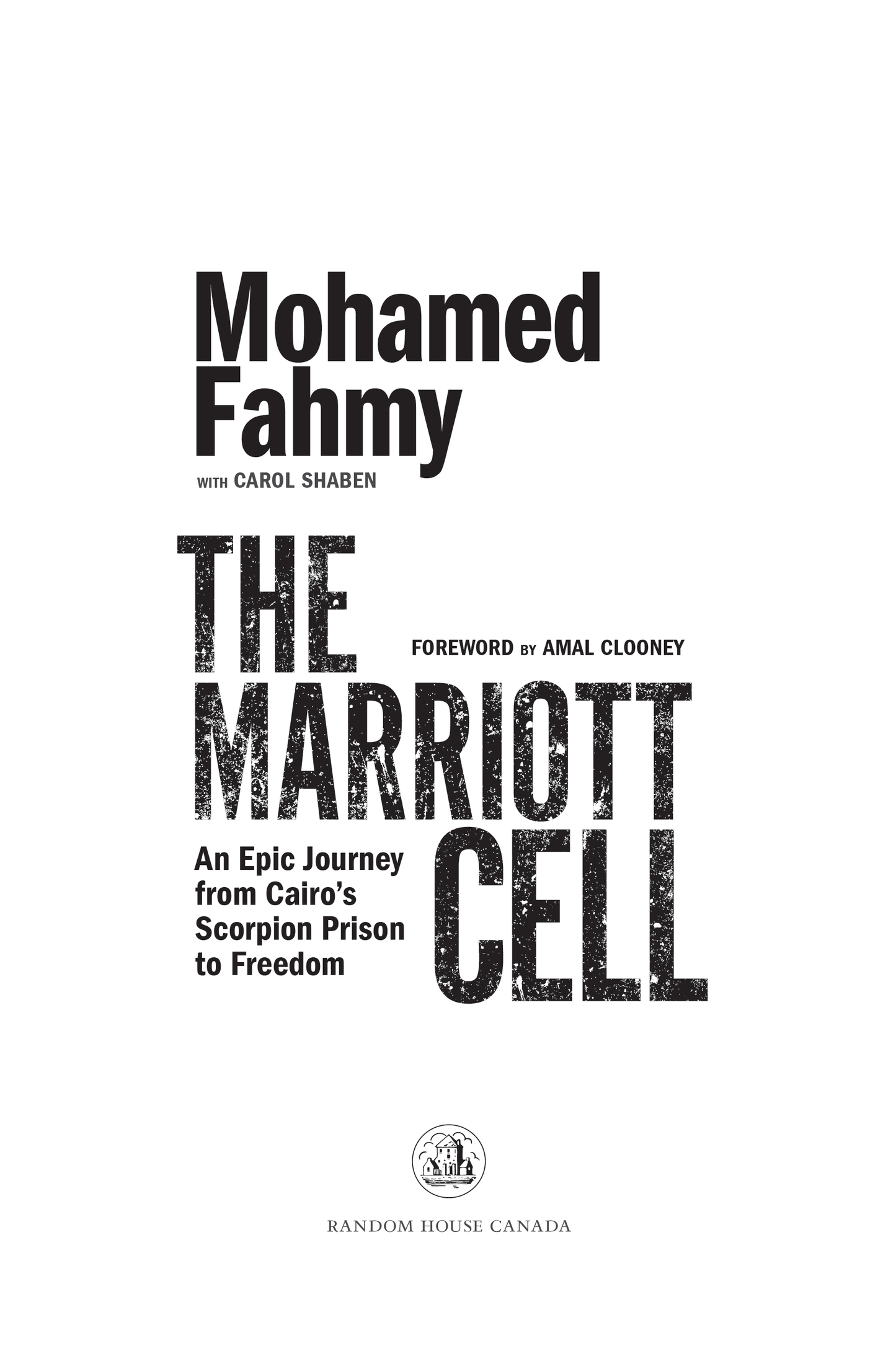Contents
PUBLISHED BY RANDOM HOUSE CANADA
Copyright 2016 Mohamed Fahmy
Foreword copyright 2016 Amal Clooney
All rights reserved under International and Pan-American Copyright Conventions. No part of this book may be reproduced in any form or by any electronic or mechanical means, including information storage and retrieval systems, without permission in writing from the publisher, except by a reviewer, who may quote brief passages in a review. Published in 2016 by Random House Canada, a division of Penguin Random House Canada Limited. Distributed in Canada by Penguin Random House Canada Limited, Toronto.
www.penguinrandomhouse.ca
Random House Canada and colophon are registered trademarks.
Library and Archives Canada Cataloguing in Publication
Fahmy, Mohamed Fadel, author
The Marriott cell: an epic journey from Cairos Scorpion Prison to freedom / Mohamed Fahmy; with Carol Shaben; foreword by Amal Clooney.
Includes bibliographical references.
Issued in print and electronic formats.
ISBN9780345816351
Ebook ISBN9780345816375
1. Fahmy, Mohamed Fadel. 2. Fahmy, Mohamed FadelImprisonment.
3. EgyptHistory1981. 4. EgyptPolitics and government1981.
5. JournalistsEgyptBiography. 6. JournalistsCanadaBiography.
7. False arrestEgypt. 8. False imprisonmentEgypt. 9. PrisonsEgypt.
I. Shaben, Carol, co-author. II. Title.
DT107.88.F34 2016 962.056 C2016-904551-X
Cover design by Lisa Jager
Cover images: (Mohamed Fahmy in court August 29, 2015) Asmaa Waguih / Reuters; (texture) Benjaminlion | Dreamstime.com
v4.1
a
I dedicate this book to the thousands of people who were killed while raising the revolution banners of the Arab Spring, the hundreds of fellow journalists slain while doing their noble jobs, and to those still languishing behind bars.
I thankfrom the bottom of my heartmy beloved family and friends who helped me win my freedom back and produce this book; especially the powerful women in my life: my most beloved wife, Marwa Omara; my mother, Wafaa Bassiouni; my lawyer Amal Clooney; my publisher, Louise Dennys; and, of course, my most admirable co-author, Carol Shaben, who in the course of writing this book has become like a sister to me.
I am most grateful to the millions of people who supported our #FreeAJStaff campaign worldwide and kept our plight alive for 438 days and defended our shared right to freedom of expression. You deserve to know the entirety of the story, and the truth about the men and the cause you fought for.
Finally, I believe the reader will understand that in order to protect the privacy of some individuals, Ive occasionally replaced a name with an initial (which itself has no reference to the original name).
Mohamed Fahmy
To my father-in-law, Dr. Baha Abu-Laban, and all other citizens of the Middle East whose lives have been forever changed by occupation, oppression and war.
Heartfelt thanks to Louise Dennys, publisher and editor extraordinaire at Penguin Random House Canada, and to the also brilliant minds and Herculean efforts of Angelika Glover and Rick Meier, as well as to my amazing agent and advocate, Jackie Kaiser. To Mohamed Fahmy, thanks for your passion, strength and perseverance. You are a true Champ and an inspiration. Finally, my love and gratitude go to my family, especially my mother, Alma, my son, Max, and my husband, Riyad, Sherpa, best friend, and love of my life.
Carol Shaben
CONTENTS
FOREWORD
BY AMAL CLOONEY
When a government uses the law to silence its critics, freedom is under threat. And when judges become the governments willing accomplices, freedom cannot survive. This is why the Al Jazeera trial in Egypt was so important. The journalists were dubbed the Marriott Cell and faced a trial for terrorism through the spreading of false news. They faced their judge from inside a cage in a packed courtroom, just a few years after the Arab Spring and in the Arab worlds most populous country. Observers in the region rightly asked themselves if this heralded the end of free speech.
We are all worse off if journalists cannot do their work. We cannot fight corruption, discrimination, and oppression if we dont know about it.
But journalism has become one of the most dangerous professions in the world. Terrorist groups like ISIS have targeted and beheaded journalists, and in every continent journalists are killed or disappeared. It is a crime in many countries to insult rulers, religions or royalsand cartoonists, bloggers and mainstream media face lengthy prison terms as a result.
Stifling criticism has serious repercussions. It means there is only one version of every story, one view on every controversy. Yet history teaches us that the minority voice is the one that society must work hardest to protect. Because it is this voice that can challenge orthodoxy, confront complacency, and open the door to progress.
Galileo was prosecuted for heresy for his discovery that the earth moved around the sun. When Nelson Mandela first dared to argue that blacks were equal to whites, he was arrested for seditious activities. And Gandhi was sentenced to six years in prison because his views were bringing or attempting to excite disaffection towards the government.
It has always been the journalists job to criticize the government and hold those in power to accountand this book is a powerful reminder that they should not be locked up for it. Our collective freedom is at stake.
Amal Clooney
Barrister
September 2016
CHAPTER 1
SCORPION
December 30, 2013
T he night I am incarcerated, as I stand shivering and exposed, surrounded by half a dozen prison guards, I cannot fathom what losing my freedom might mean. Understanding will come later, stealthily, like the cold that creeps into my body from the concrete floor beneath my bare feet.
I am in a dingy foyer clad in only my undershorts and a thin, long-sleeved undershirt. Pain lances through my right shoulder, broken two weeks before my arrest and now cradled in a black canvas sling. I brace it against my chest as a prison guard approaches and tosses a set of white, pajama-like garments at me.
He gestures for me to put them on and I step awkwardly into the bottoms using only my good arm to pull them up to my waist.
Take off the sling, he orders.
Its broken, I say, but his face remains impassive.
I reach into the pocket of my jeans, which lie discarded on a nearby wooden bench and fish out a half-full pack of cigarettes. I hold it out to him, and he slides it into the pocket of his uniform.
I am struggling to pull on the top when I see my colleague Baher Mohamed escorted into the foyer. Our eyes make quick contact. Then I watch him suffer the same humiliation, stripping to his underwear as the guards look on.


